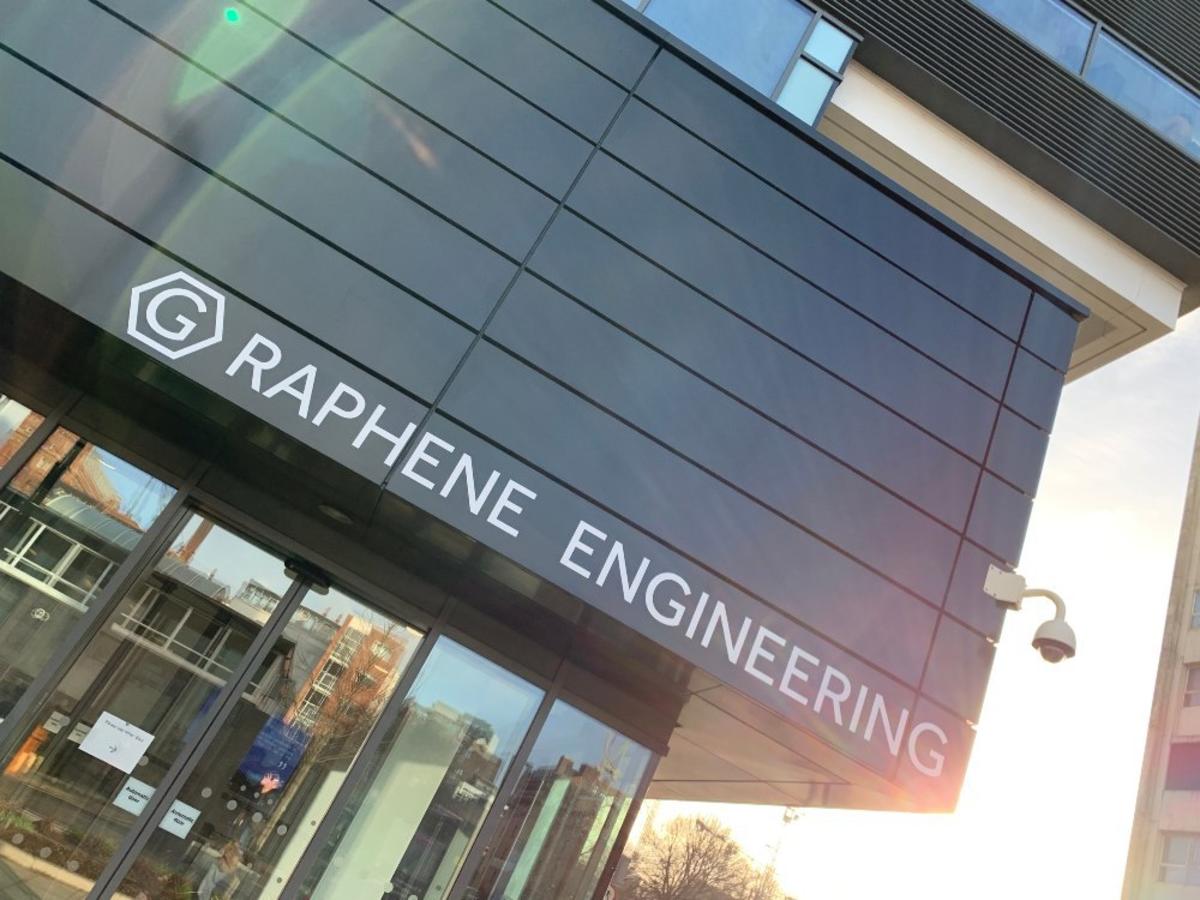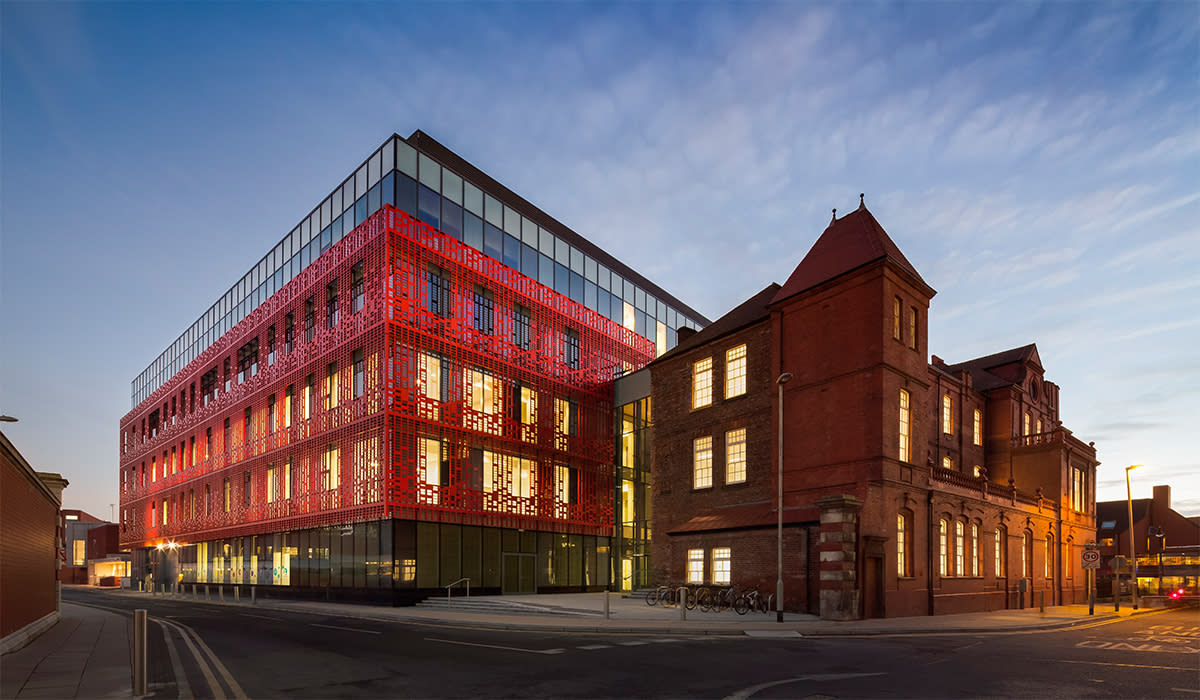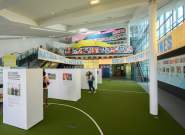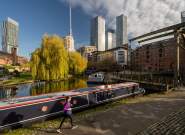The Oxford Road corridor is often referred to as Greater Manchester’s knowledge quarter. With a unique concentration of knowledge, business and cultural assets it is one of Manchester’s most vibrant neighbourhoods. Within one square mile, you’ll find two of the UK’s leading universities, the Royal Northern College of Music, the largest NHS foundation trust in the country and a huge cluster of digital and life sciences businesses, as well as music venues, auditoriums, meeting and exhibition spaces, cafes restaurants and bars.
Spanning south from St Peter’s Square in the heart of Manchester City Centre, the Oxford Road Corridor has been labelled as a place where knowledge, business and culture thrive. It’s home to over 50% of our region’s research and innovation assets as well as 50% of our life science businesses, making it a hub for new ideas and discoveries. It’s been home to some world-leading discoveries, from splitting the atom to the invention of the modern computer and more recently the discovery of Graphene.
If you’re planning on hosting an event or conference in Manchester, where better than in a knowledge hub surrounded by academic excellence, leading businesses and sector-based innovators? With sector strengths and a large talent pool, here are just some of the reasons why you should consider exploring the Oxford Road Corridor.
Home to academic excellence
Greater Manchester is home to five leading universities, two of which are located on the Oxford Road Corridor. The University of Manchester and Manchester Metropolitan University are both located within a short walk from each other, creating a hive of ideas and a unique buzz as a meeting place for great minds and academics. Also on the corridor is the Roual Northern College of Music, a world-renowned school for music offering undergraduate and postgraduate courses. The Universities are at the heart of the Oxford Road corridor and act as catalysts for the great innovations there.
Manchester’s universities are home to some of the region’s foremost research facilities spanning its sector strengths and provide access to leading talent, academics and facilities for conference planners. They also play a huge role in attracting businesses to the region and collaborating with industry to create an innovation-led ecosystem in our region. Currently, both celebrating their bicentenary years, The University of Manchester and Manchester Metropolitan University have a long legacy of being at the forefront of not only Manchester’s growth but world-changing ideas.
However, these universities also play a huge role in our region’s conference and events sector. Not only do their state-of-the-art facilities play a role in hosting events for our region and gathering specialists but, their academics support events in the region by offering expertise and sharing ideas through talks, speeches and workshops.
Now, thanks to, the Manchester Convention Bureau’s Mbassador programme, the experts at these universities can help bring events to Greater Manchester by acting as advocates for our city in their respective fields. Currently, over 300 Mbassadors use their profile and connections to help bid for and win international conferences and events in their respective sectors, which contribute £862m to the local economy, and support tourism, hospitality, and leisure across our region.

A hub for Health and Life Sciences
Manchester’s Oxford Road Corridor is home to one of Europe’s largest clinical academic campuses, which attracts a wide range of talent and expertise from across the globe. With a legacy of health firsts including the first IVF baby, bionic eye implants and pioneering cancer treatments, Greater Manchester is long associated with innovations in healthcare and creating transformative treatments.
On the corridor, it’s hard to escape our region’s life science expertise. You’ll find the Manchester University NHS Foundation Trust, one of the UK’s largest acute trusts which houses the Manchester Royal Infirmary, St Mary’s Hospital, the Royal Eye Hospital, the University Dental Hospital, and the Royal Manchester Children’s Hospital. The MFT is internationally recognised as a leading research and teaching Trust. The Trust is the main provider of hospital care for approximately 750,000 people in Manchester and Trafford and the single biggest provider of specialised services in the North West of England. It specialises in Breast Care, Vascular, Cardiac, Respiratory, Urology Cancer, Paediatrics, Women’s Services, Ophthalmology and Genomic Medicine.
The Corridor is also home to CityLabs by Bruntwood Sci Tech. This world-class hub for health innovation brings together healthcare professionals, academics and commercial partners to create a cluster of businesses at the forefront of pioneering innovation. It’s home to a cluster of diagnostics, medtech, digital health and genomics businesses helping to drive the future of healthcare in our region by connecting innovative companies with direct access to the NHS and thousands of STEM graduates from our universities.
Manchester Science Park also sits on the Corridor and is one of the UK’s most established life science and tech communities. With state-of-the-art office and lab space combined with some of the region’s most forward-looking science and tech businesses, Manchester Science Park is a hub for collaboration and innovation. It’s currently home to over 150 businesses in the heart of a bustling life science and academic hub.
Therefore, it’s no surprise that events professionals continue to bring their medical and life science events to the Oxford Road Corridor. With world-leading facilities, a wealth of expertise, a legacy of healthcare firsts and a hive of activity; it’s hard not to be inspired by Manchester’s knowledge district. This year, the University of Manchester will host The ICRS Focus Meeting on Knee Osteotomies, The American Society for Matrix Biology's ASMB 2024 Workshop on Basement Membranes and MIUA 2024 (the 28th UK Conference on Medical Image Understanding and Analysis) to name just a few.
 A global leader in Advanced Materials
A global leader in Advanced Materials
Greater Manchester is gaining a reputation as a global hub for advanced materials and manufacturing. Having secured government funding for Advanced Materials and Manufacturing, the region can support businesses, jobs and investment in this sector, helping to build on its international status.
The Oxford Road Corridor is a pivotal component of Greater Manchester’s Advanced Materials and Manufacturing legacy, as it is home to the University of Manchester and the birthplace of Graphene. Graphene is a world-changing 2D material which is just one atom thick and 200 times stronger than steel. Now, the ambition for the Oxford Road Corridor is not just to be known as the birthplace of graphene, but to be the centre of international commercialisation for a wide range of 2D and advanced materials linked to industry 4.0 manufacturing methods.
The Corridor is home to The National Graphene Institute, which facilitates collaboration on advanced materials, The Graphene Engineering Innovation Centre which specialises in the rapid development and scale-up of graphene and other 2D materials and The Henry Royce Institute, the UK’s national Centre for advanced materials research and innovation. With these world-leading, specialist facilities located next to each other, it’s no wonder the Oxford Road Corridor is becoming a thriving hub for Advanced Materials and Manufacturing research and business alike. The area lends itself to collaboration, the sharing of knowledge and building cross-sector partnerships. These buildings have been used to host a variety of conferences and events so that experts could be at the heart of this knowledge base, this includes Graphene2023, the largest European event in Graphene and 2D materials.
Aside from Graphene, the Oxford Road Corridor is also home to PrintCity, a 3D additive and digital manufacturing centre that can collaborate with Greater Manchester businesses and The Manchester Fuel Cell Innovation Centre which is spearheading the use of hydrogen fuel cell technology across the region for transport, energy, research and innovation. The Corridor is also home to many spin-out businesses and startups which can collaborate with the universities and academics to become more innovative and forge the future of our region.
A bustling digital and tech sector
Digital is one of the Oxford Road Corridor’s emerging strengths. Manchester itself is becoming internationally recognised as the UK's Top Digital Tech City and the Fastest Growing Tech Hub in Europe. The Oxford Road Corridor’s two universities and access to talent is a core driver for investment and bringing tech businesses to the region, offering access to a diverse and innovative digital talent base. The universities and their students are pioneering research in data science, AI, Digital security, fin-tech, legal tech and digital arts but also host designated programmes to support the growth and development of companies working in the digital sector.
Manchester Metropolitan University recently opened its School of Digital Arts which is a leading provider of courses including Animation, Filmmaking, Game Design, Web and UX design and Music and Sound Design. The purpose-built building offers the opportunity to innovate, collaborate with businesses in the area and also to host a range of events and conferences.
Located on the corridor Circle Square, The Bright Building at Manchester Science Park and Manchester Technology Centre, put businesses right in the heart of a burgeoning digital ecosystem, giving them access to leading talent and research on their doorstep. Organisations that are a part of this ecosystem so far include Wakelet, EPIC Games, Hilti, Block Rocket, ANS, NorthCoders, Roku, Hewlett Packard Enterprise, The Start-Up Factory, The Cyber Resilience Centre and Manchester Digital.
World-class delegate downtime
The Oxford Road Corridor is home to a lineup of world-class cultural assets, including the Royal Northern College of Music, Manchester Museum, Palace Theatre, Contact Theatre, the Whitworth and HOME which create a vibrant and lively district to live, work and enjoy.
With music venues, exhibition spaces, vibrant nightlife, a range of eateries and more, the Oxford Road corridor has a unique pulse that ripples through the city centre. This is just another reason why conference and events planners are drawn to the area; with a range of museums, galleries, nightlife and entertainment options, there are almost too many options for delegate downtime on the Oxford Road Corridor (if that’s possible).
Manchester is already renowned as a hotspot for cultural entertainment with a huge legacy of artists, writers, musicians and cultural greats. In fact, it’s recently been crowned the UK’s Capital of Culture by Adobe. With this in mind, the Corridor offers a uniquely Mancunian cultural environment which perfectly complements its knowledge and innovation activity; providing the right amount of inspiration and a dose of fun for academics, professionals and event delegates. There’s something to suit all tastes on the Oxford Road Corridor and whatever you do in your downtime it’s sure to inspire greatness.
To learn more about planning your event on The Oxford Road Corridor, contact the Manchester Convention Bureau team who can help at all stages of planning from finding a venue to connecting you with academic experts, sourcing accommodation to welcoming delegates.








